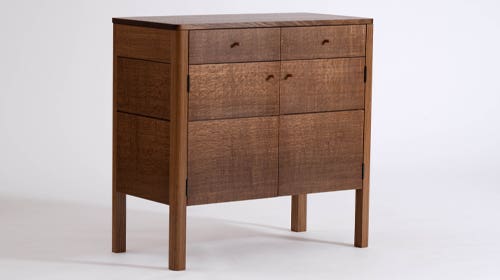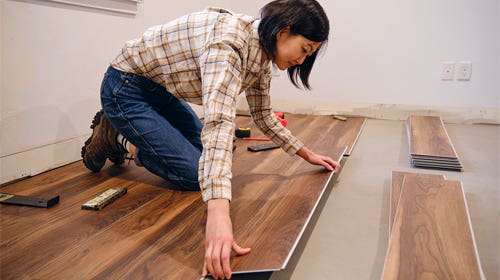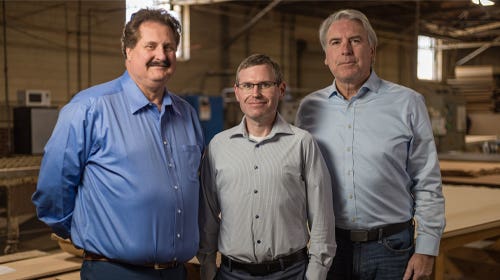Furniture Society returns to its roots
The 12th annual Furniture Society Conference, held June 18-21, revisited the group’s first meeting spot at Purchase College in Purchase, N.Y. With 430 members in attendance, this year’s rendezvous was…
The 12th annual Furniture Society Conference, held June 18-21, revisited the group’s first meeting spot at Purchase College in Purchase, N.Y. With 430 members in attendance, this year’s rendezvous was a true indicator of how the elaborate group of furniture making enthusiasts has grown over the years.
The society started with a steering committee meeting of about a dozen artisans in 1996 who held an official conference on the Purchase campus the following year. It now has roughly 1,300 members, mostly from the U.S., but including members from other countries as well. Canadians account for about 10 percent of the membership.
Ted Blachly, principal of Ted Blachly Furniture in Warner, N.H., has attended a total of five conferences at various locations. He couldn’t miss this one being that it was so close to home.
“Meeting new people and seeing friends from past conferences is always a highlight; there is a good energy going around,” says Blachly. “From a business standpoint, it gives me an opportunity to put my name and work out there. Who knows where things may lead?”
Mission accomplished
The society’s mission is to advance the art of furniture making by inspiring creativity, promoting excellence, and fostering an understanding of this art and its place in society. The annual conference, which melds those goals into several days of workshops and panels, is always held in a different city on the campus of a college or university offering a well-established craft program.
This year’s theme, “State of the Craft,” explored the breadth of contemporary furniture making — from small shops and studios to designing for industry — through an expansive forum that examined the personal and independent endeavor of studio furniture.
Keynote speaker Paul Harper, a director of ALIAS, a platform for the development of artist-led groups in the South West region of England, opened the first day of panels and presentations by emphasizing the importance of letting work speak for itself. He explained that while craftspeople may work all of their lives to say something through their materials, they still have to face the fact that they live in a literary culture that values the word over the deed.
“We live in an essentially literary critical culture that regards the object as something to be read. Craft is rooted in a world of experience, of materials and processes, of things and the life of things … It’s time to speak up,” Harper said in his speech.
Toshio Odate gave a rousing talk on “The Morality of the Craftsman,” regarding his ideas concerning the difference between artists and craftsmen and their interaction in society. He spoke to the essential elements of craftsmanship: learning to do things well and right, and then having the conviction to hold oneself to those standards every day.
The panel, “A Conversation with Wendell Castle,” featured Castle and gallery owner Bebe Pritam Johnson engaged in an intimate and frank discussion of Castle’s work and career. Johnson — who knows Castle well — could have sugarcoated the exchange but didn’t, challenging him on several points and insisting he explain some of his positions.
“College of the Redwoods: A School for Impractical Furniture Makers?,” moderated by Woodwork magazine editor John Lavine, included alumni Brian Newell, Tim Coleman, Jenn Anderson and David Fleming. The panel attempted to quantify the school in terms of Krenov’s contributions to the field over the last 25 years. Perhaps understandably, it devolved somewhat to a discussion of Krenov’s personality — he is nothing if not forceful and influential — and how the school functioned both when he was actively teaching and since then.
There were several eco-related presentations having to do with sustainable-yield harvest, recycling and urban materials use. Andrew Pitts of Heathville, Va., gave a presentation on “Milling and Drying Wood for the Small Workshop” that wasn’t necessarily billed as a “green” presentation, but certainly fell into the same genre. Pitts described the many ways furniture makers can take better advantage of a very underutilized resource, such as the wood and trees in a woodworker’s backyard.
Two of a kind
Walker Weed and Wendy Maruyama were honored at a luncheon ceremony on the first day where they received the Award of Distinction, a special annual recognition of exceptional makers within the society.
Weed, 89, is a self-taught furniture maker with a shop in Gilford, N.H. and trustee of the American Crafts Council. He gave members a good dose of his philosophical approach to work and making, and even a few laughs when he joked about breathing sawdust his entire career and still being alive today.
Maruyama, an artist and educator from San Diego, whose work is known for its deviation from the norm in the field of studio furniture, accepted her award with dignity, and more than a few tears. Those present agreed she’s a true leader who has always exuded talent and stamina, while battling gender and disability issues.
“I think there’s no one walking upright more deserving of the Award of Distinction than Wendy Maruyama,” says society member David Fleming of Scottsdale, Ariz. “Given her history, her body of work and the influence she has had as an educator, I don’t think anyone else comes close. It’s no surprise that so many of her current and former students showed up at the conference to support and congratulate her. She’s had a profound impact on their work and lives, and they obviously remain devoted and connected to her.”
A chance to be seen
A handful of exhibits always grace each conference, featuring work by members and non-members from across the world. The juried exhibit is traditionally a highlight to the show, and only a select few pieces are chosen to represent each year’s theme. This year’s juried show was themed “Multiplicity: The Art of the Furniture Prototype.” There were more than 300 applicants and 22 were selected for display at the school’s Neuberger Museum of Art.
Chris Poehlmann, exhibit organizer for the society, says he was stunned by how many entries for the juried exhibit came from artisans residing outside the U.S., such as India, the United Kingdom and Singapore. He explained that the importance of the exhibit was to illustrate the fact that furniture can be designed to be mass-produced, but still have unique customized elements. The secret is working in different colors, shapes and other features to the individual pieces when off the production line.
Other exhibits included “Seats of New York: Benches, Stools & Chairs from across the State,” which presented a sampling of seating furniture by makers currently working in New York. The Members Gallery invited all members who registered for the conference to submit a piece, which was a great opportunity for those looking to gain experience exhibiting their work.
A worthwhile experience
A chairmaking workshop was one of the more popular hands-on presentations on the schedule and featured Vivian Beer, Curtis Buchanan and Will Neptune. As they built chairs of their own designs, each artist demonstrated the processes they use, shared their design motives, and explained how material affects both their design and building techniques.
Grey Jackson of G. Jackson Furniture in Kilgore, Texas, says this workshop made his travel efforts worthwhile. “It was good to have been there. I don’t know where I would have gotten another chance to see that. The people building were real good about answering questions,” he says.
Most attendees agreed networking is one of the most valuable parts of the conference. They get to know other artisans with different approaches and, in the process, gain a better understanding of and appreciation for their work and philosophy.
“Without the kind of opportunities the Furniture Society offers, we would miss the many benefits that can come from gathering, sharing our work and our frustrations, and garnering new ideas, thoughts and approaches,” says Alf Sharp, a furniture maker in Woodbury, Tenn.
Jeff Miller, of J. Miller Handcrafted Furniture in Chicago, says he is most interested in the exchange of ideas at the conferences.
“There are the many different ways that people think about their work as well; from the highly philosophical to the very gritty realities of wanting to find a way to use a particular tool,” says Miller.
Josh Markel, a furniture maker from Philadelphia, was only able to attend one day. He made the most of it.
“I went to a session on bent laminations, which was quite interesting because I do a lot of them and the workshop instructor had some innovative techniques,” Markel says. “I also like hearing about projects that people are doing that are related to the field, such as several people’s work trying to use woodworking and furniture making as a development strategy in the Third World.”
Frank Burns of Boston attended the conference for the first time as a new society member. He was excited to interact, discuss, and share with so many experienced and talented makers. “These conferences and the society in general, I believe, fill a very important role in that they build and maintain community for people engaged in work that is essentially solitary,” he says. “You and the tool and the material hang in the balance until you, the creator, precipitate movement in a unique direction. To be able to share these very personal experiences, whether verbally or just through the viewing of others work, encourages and stimulates me to continue.”
See you in Boone
After commenting on the exceptional turnout of the conference, Furniture Society president Rachel Fuld says the group is focusing on its Educational Grants program, which helps members pursue individual study or to attend classes at any of the many excellent furniture-related programs around the country. In other matters, the society board has decided to keep the search open for an executive director, and Lynn Szymanski will step down from her position on the board to fill the role of interim executive director.
Next year’s conference will be held June 10-13 at Appalachian State University in Boone, N.C.
Contact: The Furniture Society, 111 Grovewood Road, Asheville, NC 28804. Tel: 828-255-1949. www.furnituresociety.org







